Medical expert article
Can pregnant women sunbathe? A question that interests expectant mothers whose pregnancy falls at the height of the beach season. Let's look at this question, find out whether it is possible to sunbathe during pregnancy, what precautions to take, what to be wary of and how to protect your unborn baby from the scorching sun.
During pregnancy, women behave very carefully, since even the best habits and seemingly harmless procedures can harm the unborn baby. In the midst of summer, expectant mothers are faced with the urgent question of whether pregnant women can sunbathe. Or will you have to forget about relaxing on the beach, sunbathing and swimming in ponds during pregnancy?
The first thing that worries any pregnant woman in the summer is rumors about the dangers of ultraviolet radiation, which is contained in abundant quantities in the sun's rays. But this is not a reason to refuse the opportunity to sunbathe during pregnancy. Scientists have proven that solar radiation can help cure many diseases, that is, the sun acts as a doctor.
- For pregnant women, sun tanning is primarily a good mood. Scientists have proven that sun rays are the best antidepressant. And if the mother is in a good mood, then the baby is happy too!
- Another fact in favor of tanning during pregnancy is that the sun's rays speed up metabolism, that is, metabolism. The immunity weakened by pregnancy improves, the body gains strength and actively fights germs and bacteria from the external environment.
- Tanning during pregnancy increases the amount of hemoglobin in the blood and improves the functioning of the endocrine glands. Prevents osteoparosis, that is, a disease that is associated with damage to bone tissue.
- Sunlight promotes the production of vitamin D, which is responsible for the health of the unborn baby. This is an excellent prevention of childhood rickets.
Tanning during pregnancy will be useful for those mothers who lack sunshine. We are talking about residents of northern, cold regions. In addition, tanning during pregnancy will help cope with immunoconflicts.
[1], [2]
Tanning during pregnancy
Tanning during pregnancy is allowed, but precautions must be taken. The first thing you need to know is that your tan fades much faster during pregnancy. This occurs due to changes in the hormonal background: estrogen levels increase, because of this, melanin pigment is intensively formed. Thanks to this, the skin acquires a chocolate, tanned hue. Expectant mothers should be careful when sunbathing, as this may have negative consequences.
Tanning during pregnancy and safety rules:
- Avoid direct sunlight, relax under a beach umbrella or in the shade of a gazebo. If you are worried that you will leave without a tan, then it is in vain, as the tan will find you here too.
- Pay special attention to the temperature outside the window. If the thermometer is above + 30 ºС, then it is better not to go to the beach or under the scorching sun. It is better to sunbathe in the morning and evening, but from 11 to 15 it is better to refrain from resting in the sun. Because you can get sunburn and heatstroke.
- If you are going to relax on a beach with pebbles, then do not forget that the pebbles get very hot under the sun, so take a rug or blanket with you, or best of all, a sun lounger.
- Don't go to the beach right after lunch or on an empty stomach. This will negatively affect your well-being under the scorching rays of the sun.
- When going to the beach or relaxing in the sun, wear light, loose clothing that will not restrict movement and will allow air to pass through well. Don't forget about a hat and sunglasses.
- If you sunbathe or swim, don't forget that ultraviolet radiation is just as active in water as it is on land, so don't overdo it while sunbathing.
- Drink more water, this will protect your body from dehydration. Use hygienic lipstick, it will prevent your lips from drying out and cracking.
Remember that failure to properly tan during pregnancy can cause many complications. Prolonged exposure to the sun can cause uterine bleeding, fainting, heat stroke and cause pigment spots to appear on the body and face of a pregnant woman.
Tanning in early pregnancy
Tanning in the early stages of pregnancy is possible, but, as in the second and third trimester, it requires compliance with the rules of safe tanning.
When tanning in early pregnancy you should:
- Gradually begin to sunbathe without overdoing sunbathing. Half an hour is enough, you can gradually increase the time.
- In the early stages of pregnancy, you should sunbathe before 11 a.m. and after 6 p.m.
- Don't forget about sunscreen, which will protect you and your baby from ultraviolet radiation.
Do not sit too long in the sun, as tanning in early pregnancy can result in heat stroke. If you do experience heatstroke, drinking plenty of fluids, bed rest, and always consulting a gynecologist will help you get rid of the symptoms and not harm your unborn baby.
Instant tan during pregnancy
Many mothers use instant tanning during pregnancy and do not worry about the consequences. But is it possible to use instant tanning during pregnancy or can it harm the health of the unborn baby?
For an instant tan, use self-tanning cream, which gives the skin a golden, tanned color, like a natural, natural tan. The thing is that when using instant tanning cream, you expose your skin to the action of dihydroxyacetone, which penetrates through the skin into the circulatory system. The use of this cream during pregnancy theoretically exposes the baby to danger, since the placental barrier is not a barrier to harmful substances reaching the baby through the circulatory system.
There is no exact data on the effect of instant tanning on pregnancy. Since no studies have yet been conducted that would confirm the harm of self-tanning on a growing body. Remember that many doctors discourage the use of instant tanning products during pregnancy. Therefore, think carefully before causing potential danger to your unborn baby.
Sunscreen during pregnancy
Sunscreen during pregnancy helps protect the body and the unborn baby from the harmful effects of ultraviolet rays. When heading to the beach, don't forget to choose the right sunscreen. A good sunscreen should create a tan but block the sun's harmful rays. For pregnant women, sunscreen should have the highest level of protection.
Sunscreen creams are easily washed off with water, so don't forget to apply the product after swimming. By the way, before going to the beach, apply the cream 20 minutes before sunbathing. When choosing and purchasing sunscreen, special attention should be paid to the SPF index. SPF is a sun protection factor. The choice of SPF depends on your skin type and the area in which you plan to sunbathe. Remember that SPF shows how many times you can increase your time in the sun by using a spray or sunblock.
Pregnant women should know that they should do a skin test before applying sunscreen. Due to hormonal changes in the body of a pregnant woman, an allergic reaction may occur even to a drug that was well absorbed by the body before pregnancy. Do not forget that after using sunscreen, after prolonged exposure to the sun, you must apply after-sun cream to your skin. The after-sun product will allow you to fix a beautiful chocolate tan on your skin and prevent the appearance of age spots.
[3], [4], [5]
Tanning during pregnancy in a solarium
Tanning during pregnancy in a solarium is another opportunity to get tanned skin quickly, using artificial ultraviolet radiation. When tanning in a solarium during pregnancy, you should remember that no research has yet been conducted to prove the harm or benefit of solarium on the body and the unborn baby.
Doctors cannot accurately answer the question of whether it is possible to sunbathe in a solarium during pregnancy, but they do not recommend this procedure. Artificial tanning is safer than natural tanning, as it prevents the possibility of overheating, but this does not exclude a number of other problems and complications.
Tanning during pregnancy in a solarium has a number of rules:
- The session should not last longer than 20 minutes.
- It is strictly forbidden to visit the solarium if, in addition to pregnancy, you have diseases such as diabetes, thyroid disorders and mastopathy.
- Do not sunbathe naked, cover sensitive areas of the body.
- During the session, use special glasses, as tanning in a solarium without them can lead to retinal burns.
- Before starting a tanning session in a solarium, be sure to wash off your makeup and do not wear perfume, as this can cause allergic reactions.
Tanning during pregnancy in a solarium can cause age spots to appear due to hormonal changes in the body. Also, during pregnancy, it is easy to overheat in a solarium, so control the time you spend in the solarium if you decide to use artificial tanning during pregnancy.
Instant tanning during pregnancy - reviews and comments
Before deciding to get an instant tan during pregnancy, every mother should read the reviews of those who have decided to undergo this procedure.
It is difficult to get an instant tan during pregnancy, as there is a risk of complications and the development of diseases. Tanning can cause termination of pregnancy, that is, miscarriage, provoke bleeding, or pose a threat of premature rupture of amniotic fluid.
Instant tanning during pregnancy, reviews from expectant mothers:
Olga, 24 – “Instant tanning, a cool procedure that in a couple of minutes gives your skin the color of a month’s holiday at sea under the sun.”
Before pregnancy, I used instant tanning services, went to the solarium and used self-tanning creams. I tried the procedure during pregnancy. The only drawback was that I had to wait 8 hours after the procedure before washing, as the salon warned that the tan might fade.
Irina, 32 – “Instant tanning is the most inappropriate procedure during pregnancy.”
I did not discover the advantages of instant tanning, since immediately after the procedure, all the artificial tan ended up on my clothes. In addition, the tan did not fade evenly. Just imagine, the back is white, and the arms and ankles are tanned. Once again I was convinced that pregnancy is not the time for experiments.
Tatyana, 40 - “I was afraid, but still decided.”
I decided to tan during my third pregnancy, and did not regret it. The tan went on evenly, despite the fact that I have rather capricious skin and a natural tan does not last longer than two to three days on me. I am satisfied with the procedure, the only drawback is that the price is too high.
Alexandra, 19 – “A safe way to be beautiful during pregnancy.”
As soon as I found out that I was pregnant, I decided to take good care of myself. In the second trimester I went to the solarium. I did 4 procedures for 15 minutes each, and I was generally satisfied with the result. The only drawback is that after the last procedure, the entire result remained on the sheets. The doctor explained this as hormonal imbalances.
Zhenya, 27 – “Artificial tanning during pregnancy is a waste of money”
Girls, future mothers, do not risk your health! Before the New Year, in the fifth month of pregnancy, I decided to become a mulatto, bought a spray tan and really regretted it. A friend who works as a cosmetologist applied the spray. After using self-tanner, a small red rash appeared all over my body, which itched terribly. The result was terribly frightening, because I didn’t know how to treat this allergy, I had to wash my body with chamomile lotions. This helped relieve the itching and the color gradually faded.
Whether you can sunbathe during pregnancy is up to you to decide. But remember that you are not protected from the effects that artificial tanning or sun exposure can cause. Take care of your health and the health of your baby, because you will always have time to sunbathe!
The summer season is always accompanied by relaxation. Therefore, the question regarding whether pregnant women can sunbathe in the sun becomes extremely relevant. In the early stages, experts allow expectant mothers to bask on the beach, but only in the absence of contraindications and in compliance with the rules of tanning. Let's not get ahead of ourselves, let's look at the main aspects in order.
Contraindications to tanning for pregnant women in the early stages
Tanning during pregnancy can cause significant harm in some cases. To find out whether you can sunbathe your stomach and other parts of your body, first rule out any contraindications.
These include:
- mastopathy;
- diabetes;
- metabolic disorder;
- ischemia;
- hypertension;
- other ailments of the heart and blood vessels;
- dermatological problems;
- difficulties in the functioning of the endocrine system.
Important!
For all of the above diseases, tanning is strictly contraindicated. The rest of the expectant mothers with a normal pregnancy are allowed to bask in the sun after consultation with the doctor. A specialist may prohibit staying on the beach if there is a threat of losing a child.
The benefits of tanning during pregnancy
We have sorted out the question of whether pregnant women can sunbathe in the sun. Find out what benefits sunbathing will bring in the early stages.
1. The body of the expectant mother in the first trimester is rebuilt in a new way. Therefore, there may be a hormonal imbalance and, as a result, mood changes, apathy, depression and other psycho-emotional difficulties. The sun's rays act as an antidepressant, improve mood and make a woman happy.
2. The sun triggers absolutely all metabolic processes, the girl’s body works better and more harmoniously. The fruit is formed in accordance with the term without the risk of deviations.
3. Experts have found that sunbathing strengthens the immune system. In the future, it is much easier for a woman to endure climate change, temperature changes, and virus attacks. Together with the mother, the fetus is also protected.
4. If you stay in the sun at the “right” hours, hemoglobin levels in the blood increase. This has a positive effect on the brain, heart and endocrine system.
5. Solar procedures promote the production of vitamin D. It is necessary to strengthen and form the baby’s skeleton, as well as prevent rickets in the future.
6. There is another positive feature of the accumulation of vitamin D in the body specifically for the mother. If hair, nails, or skin are suffering, this substance will improve the absorption of calcium and make a woman even more beautiful.
After studying the benefits, there is no doubt whether pregnant girls can sunbathe in the sun. Staying on the beach in the early stages will improve your condition and allow the fetus to form correctly.
Harmful tanning for pregnant women
Tanning during pregnancy has been studied quite extensively. It is harmful or beneficial depending on the individual characteristics of the woman.
1. If you do not spend enough time in the sun, pigment spots may appear. They cover different parts of the body, and the tan looks unsightly. Not all ladies have pigmentation; only girls with a genetic predisposition are prone to it. To protect yourself, use a cream with UV protection.
2. Danger lurks in case of overheating. Against this background, the temperature rises and the formation of the fetal central nervous system may worsen. Heat stroke and loss of consciousness, as well as impaired uterine tone and bleeding should not be ruled out.
3. When you spend a long time on the beach, water metabolism is disrupted. This leads to dehydration and worsening pregnancy.
4. If the expectant mother boasts fair skin, it is possible that she will burn in the very first minutes of sunbathing. Therefore, the cream is selected very carefully.
Rules for tanning during pregnancy
Is it possible for pregnant women to visit a solarium or sunbathe in the sun? We have already figured it out. Now let's study the rules of tanning in the early stages.
1. You can bask in the sun only if the air temperature does not exceed 30 degrees.
2. You should not go to the beach between 11:00 and 17:00. At this time, the sun is aggressive, so it will cause damage to you and the fetus.
3. Do not stay in the open sun. Choose a place under trees or canopies. You will still get a decent portion of ultraviolet radiation, but there will be no harm.
4. Protect your stomach and chest from the sun. For this purpose, wear a light sundress or cover yourself with a pareo. Don't forget a wide-brimmed hat and glasses.
5. Choose a cream with UV protection taking into account your phototype. Especially carefully lubricate the areas that are most often burned.
6. Make sure you have plenty of clean water on the beach. Drink it without allowing fluid loss. As a supplement, you can take chilled green tea.
7. In order not to once again wonder whether pregnant women can sunbathe, you need to regularly cool your body heated in the sun. In the early stages, you can regularly take a cool shower or cool off in a pond without any problems.
8. It is prohibited to fall asleep on the beach. You may get sunstroke or experience overheating of your body and entire body. It is also worth limiting travel to hot countries and exposure to direct sunlight during peak UV ray activity.
Which cream is best to use for pregnant women?
Tanning during pregnancy will not cause harm if you choose a high-quality protective cream. It must have an optimal SPF filter. Such products prevent redness of the skin. Whether pregnant women can sunbathe in the sun will directly depend on the phototype of the skin. If you use the special cream correctly, no problems should arise either in the early stages or later.
Main skin phototypes
First. This includes light-skinned people who are very easy to recognize. The skin is thin, light and sensitive. In addition, the hair can be blond or red. Eyes blue, gray. There are also freckles. You need to take a cream marked SPF-15, no lower.
Second. Light skin tone, practically no freckles. The hair is often light, as are the eyes. Such people quickly burn in the sun; the product should be used with SPF-12 or higher.
Third. People belong to the Central European type. They can be recognized by their skin color (ivory). Hair can be either dark or light brown. Eye color – light brown/hazel. The tan goes on evenly and turns out beautiful. The cream needs to have an SPF-10 filter.
Fourth. The skin color is somewhat reminiscent of olive. Hair is black or dark. Eyes of a similar shade. With this type of skin, people practically do not get sunburned, and the tan goes away quickly. The protective composition can be selected with SPF-6 or higher.
Important!
If you have a third or fourth skin type, experts recommend choosing creams marked SPF-20 at least during pregnancy. If the skin is lighter (first, second), then you will need a product with an SPF-30 filter. In this case, it is worth taking into account the individual characteristics of your body.
Is it possible for pregnant women to sunbathe? The answer is obvious. Only in this case you need to observe some subtleties. To avoid getting sunburned, go to bodies of water during safe hours and use protective equipment. In the early stages, it is not recommended to purchase flavored formulations; they often provoke toxicosis.
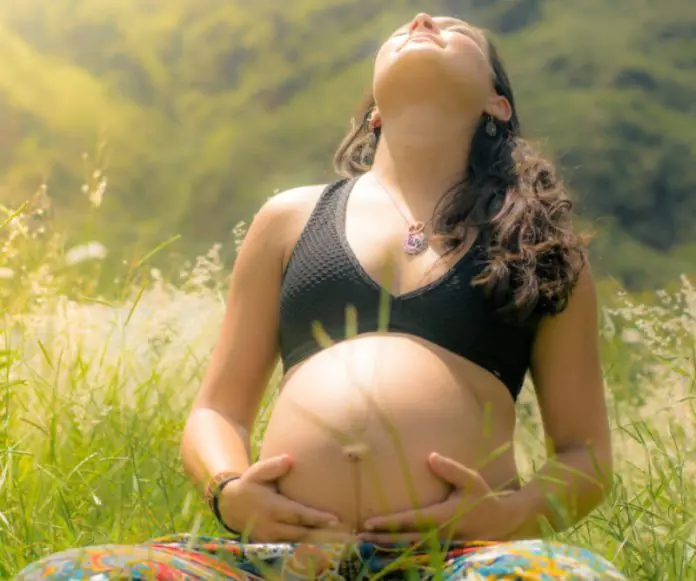
The long-awaited summer has arrived and the holiday season has begun. Finally, you can take a break from the cold and get a magnificent bronze tan while basking in the gentle rays of the sun. Everyone dreams of this. And future mothers waiting for the birth of their child are no exception.
Therefore, many women think about whether it is possible to sunbathe during pregnancy? Is this useful? What are the features at different stages of pregnancy? What are the rules and features of sunbathing during pregnancy?
All information about this is below!

Features of the effects of tanning on the body of a pregnant woman
For expectant mothers, the sun is an excellent source of vigor and energy. However, prolonged exposure to the sun is risky for pregnant women. The sun has a special effect on the body of pregnant women. Why shouldn't pregnant women sunbathe for a long time?
- Firstly, prolonged tanning contributes to overheating of the entire body. The baby may suffer from this, because severe overheating can seriously impair the development of the brain of an unborn child. An increased dose of ultraviolet rays can harm the baby's nervous system.
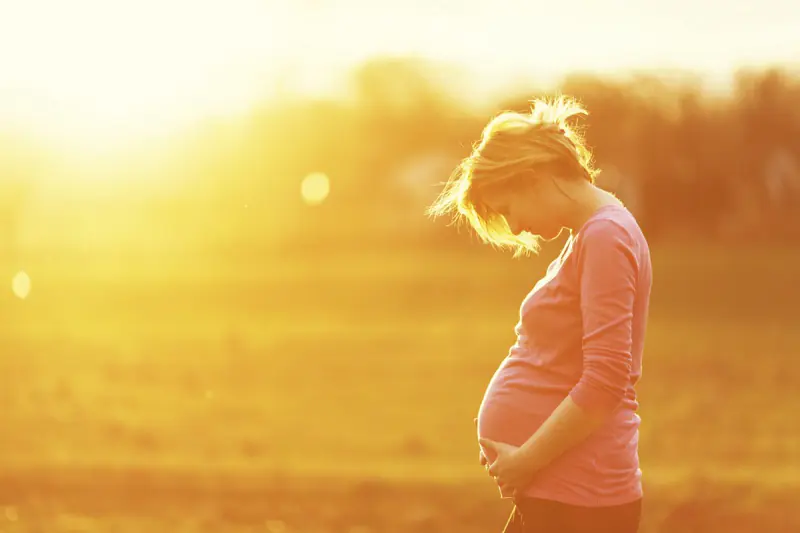
- Secondly, prolonged exposure to direct ultraviolet rays will lead to the destruction of folic acid. This will harm the mental and physical development of the child.
- Thirdly, being in the sun for a long time can increase your blood pressure. Consequently, prolonged and excessive tanning during pregnancy can lead to uterine bleeding.
Before sunbathing, pregnant women should consult a doctor! and only after his approval, sunbathe!
If there are contraindications and a doctor’s prohibition, sunbathing is strictly prohibited!

Contraindications to tanning and dangers to the body and fetus of a pregnant woman
Most experts say that tanning is contraindicated for pregnant women. They explain it this way:
- dry hot air has a detrimental effect on well-being;
- there is a possibility of becoming a victim of sunstroke;
- while on the beach, you can injure your stomach, which will lead to infection;
- in case of a huge crowd of people, it is possible to injure the stomach (for example, a flying ball);
- the sun's rays pose a danger to a pregnant woman if she has many moles on her body
Although there are benefits to sunbathing, there is still some danger for both the baby and his mother:
- Long-term exposure to sunlight may cause age spots to appear on a pregnant woman's body. They mainly appear on the face, back, hands, ears, and neck area. But not all pregnant women undergo pigmentation, but only those who have a predisposition. Experts advise such women to spend as little time in the sun as possible.
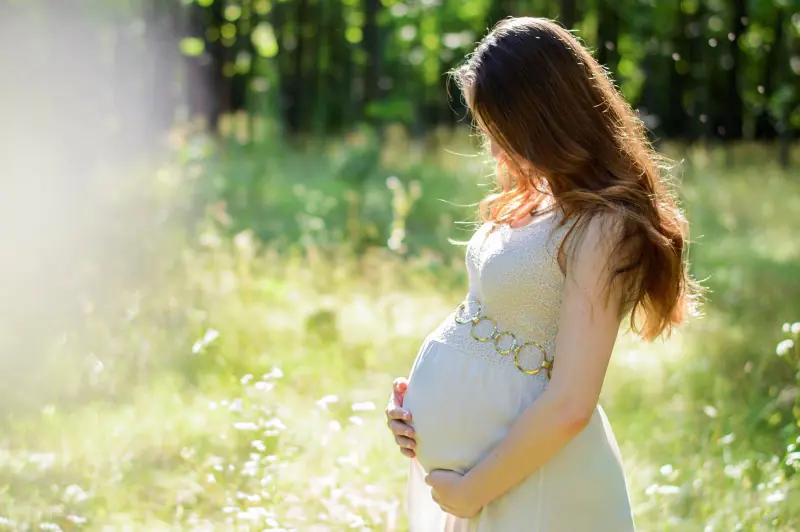
- Pregnant women are not recommended to overheat their body, as this is very dangerous for the unborn child. Increased mother's body temperature will negatively affect the development of the baby's nervous system.
- You can get sunburn. This mainly applies to women with fair skin.
- Prolonged tanning during pregnancy can lead to dehydration.
Before visiting the beach, you should consult a doctor and follow all safety measures before sunbathing and on the beach itself.

Rules for tanning in the sun depending on the trimester
Conventionally, pregnancy consists of three trimesters. Consequently, for each of them, the tanning procedure during pregnancy has its own characteristics and its own rules.
First trimester
Is it possible to sunbathe in the early stages of pregnancy - that is, in the first trimester? In the early stages of pregnancy, you are allowed to freely enjoy the bright rays of the sun. Precautionary measures are not as strict as in the last stages of pregnancy:
- It is recommended to reduce the time spent under ultraviolet rays. It's not worth the risk. The greatest solar activity is observed from 10.00 to 16.00. At this time, you can’t be on the beach at all.
It is not recommended to stay in the open sun for more than 10 minutes for pregnant women, those suffering from heart disease and those with circulatory disorders.
- At any stage of pregnancy, to protect yourself from the sun, you should cover your head with a scarf or hat.
- The sun can speed up all processes occurring in the body. So there is a possibility of getting a seizure.
- A tan “sticks” to a pregnant woman faster than to an ordinary woman. This is due to the accelerated production of hormones, so the skin color will be rich. But there is also a danger of getting burned.
Control your time in the sun and use protective creams.
Now you know whether you can sunbathe in the first trimester of pregnancy. But remember to be careful and take care of yourself on the beach!

Second trimester
Is it possible to sunbathe in the second trimester of pregnancy? You can, but you must follow the rules:
- It is not advisable to stay in the open sun longer than expected. At this stage, there is a high probability of becoming covered with brown spots all over the body. The appearance of pigmentation occurs during periods of solar activity.
- You should choose a shaded area for relaxation.
Even sitting in the shade, a pregnant woman can get a good tan.
- You cannot sunbathe on sand and pebbles. It is better to sunbathe using a sun lounger.
If the street temperature exceeds 30°C, then it is better not to go to the beach at all.

Third trimester
Is it possible for pregnant women to sunbathe in the later stages - that is, in the third trimester? It is possible, but in the last stages of pregnancy, compliance with safety measures for exposure to the sun should be significantly strengthened. You cannot think that if the fetus is no longer small, then nothing threatens it. We need to be vigilant.
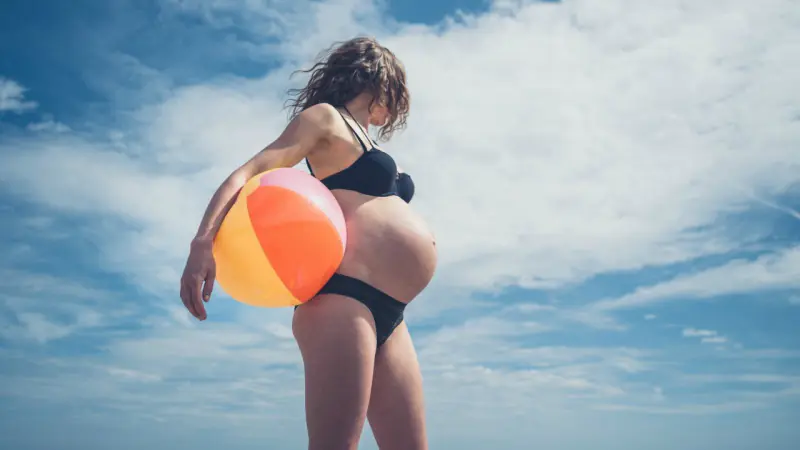
- Before going to the beach, you shouldn't eat too much. Overeating will negatively affect the well-being of the expectant mother.
- Another important detail is protecting the skin in the neck and abdomen from the sun.
When sunbathing, you should always cover your stomach.
- It is recommended to drink plenty of fluids. This will help avoid dehydration.
- The body must be constantly cooled (showering or swimming in a pond).
- It is prohibited to fall asleep on the beach. There is a chance of overheating and getting sunstroke.

General rules for safe tanning for pregnant women at all stages
How to sunbathe correctly and safely for pregnant women? You should monitor your health and follow the rules below:
1. You need to sunbathe only during safe hours! Staying on the beach or spending a long time in the open sun after 10 and before 16 is strictly prohibited!
2. It is better to be under the shade of trees or an umbrella; tanning in direct rays is prohibited. This article has detailed information about tanning in the shade.
3. Go out in the sun only with a hat! It is better if it is a hat with a wide brim that protects the head well.
4. You cannot stay in the sun for more than half an hour.
Long tanning during pregnancy is prohibited.
5. When in the sun, drink plenty of plain, clean water! Dehydration is unacceptable.
6. Lie only on a sun lounger or hammock! You cannot lie on the sandy beach or pebbles.

7. Wear a swimsuit made from natural fabrics and cover your belly.
There are special swimsuits for pregnant women, give preference to them
8. Use only high-quality and safe sunscreens! More about this below.
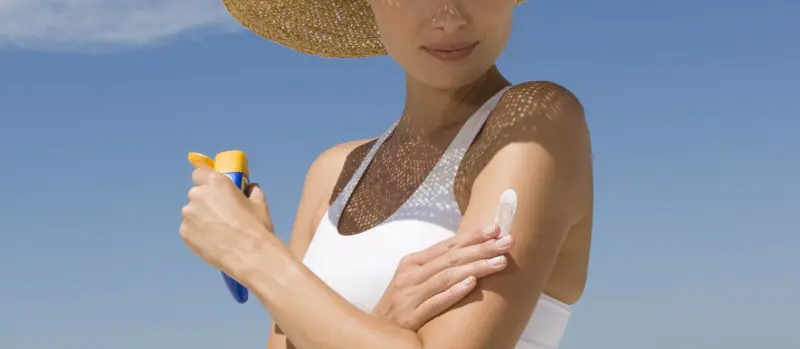
Which sunscreen is suitable for a pregnant woman?
The best protection against sun rays for pregnant women remains the use of sunscreen. But which sunscreen is safe for pregnant women?
1. Choose a high-quality sunscreen with a good, natural composition. You should carefully study the components of the cream so as not to harm the child.
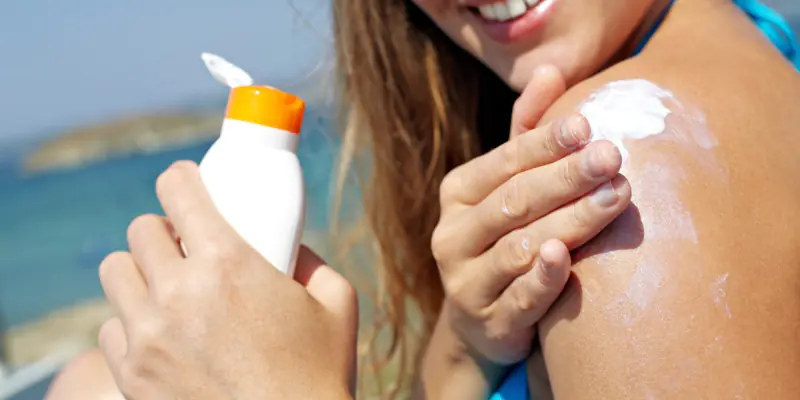
2. Expectant mothers are recommended to use a cream that contains components such as starch, titanium dioxide, and zinc oxide. These components serve as a kind of shield from the effects of ultraviolet rays. As soon as the cream gets on the skin, a film immediately forms that can reflect ultraviolet radiation.
3. A high-quality sunscreen should contain natural ingredients: various plant components (for example, aloe, green tea), various natural oils, vitamin E, C, minerals.

4. It is not recommended to use creams with a high content of synthetic, aggressive substances, dyes, flavors, and alcohol.
5. Don't forget to choose a cream based on your phototype. The following phototypes exist:
- the first phototype is light-skinned and fair-haired women;
- second phototype - women with skin slightly darker than the first type;
- third phototype - dark-haired and dark-skinned women;
- fourth phototype - very dark skin, dark hair.
In conclusion, we can draw a conclusion. Pregnant women are allowed to sunbathe. The main thing is to take all necessary precautions. Do not overexpose yourself to the open sun. If the pregnant woman is in good health and has no contraindications, then a beach holiday will only bring benefits.
Now you know whether it is possible to sunbathe during pregnancy, and how to do it correctly. Don't forget to follow the rules of safe tanning for pregnant women, listen to your body, and follow all doctor's recommendations!



